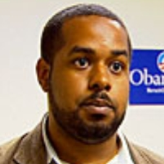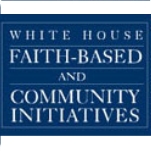Officials
Back to Officials


Offical

Name: DuBois, Joshua
Current Position: Previous Director
President Barack Obama’s choice for taking over the reconfigured Office of Faith-Based Initiatives (now known as the Council for Faith-Based and Neighborhood Partnerships) was a 26-year-old Pentecostal associate pastor named Joshua DuBois. He assumed the position in February 2009.
Born in Bar Harbor, Maine, DuBois spent time growing up in Cambridge, Massacusetts, Nashville, Tennessee, (which he considers his hometown), and Xenia, Ohio, where he attended high school. His grandmother participated in the 1960 Nashville sit-ins and used to tell her grandson stories about being spat on. The stepson of a minister at an African Methodist Episcopal church, a branch of Christianity born in protest against slavery in 1816, DuBois’ father is a minister in the African Methodist Episcopal Church, and his parents exposed him to James Dobson’s “Focus on the Family” radio show.
In 1999, during DuBois’ freshman year at Boston University (BU), four police officers in New York City gunned down an unarmed Guinean immigrant named Amadou Diallo, who was shot 41 times. Local and national outrage followed the shooting and the trial, which resulted in the police officers being acquitted. Although he had no prior history of social activism, DuBois was so upset over the Diallo case that he decided to conduct his own one-man protest. Holding a sign that read “NO MORE,” he stood on Commonwealth Avenue in Boston, in front of a memorial to Martin Luther King Jr., for 41 hours—one for each shot that killed Diallo.
During his vigil, DuBois met Eugene Schneeberg, a fellow student at BU, who invited DuBois to church at the Calvary Praise & Worship Center, a tiny evangelical congregation affiliated with the United Pentecostal Council of the Assemblies of God, a small, predominantly African-American denomination. DuBois liked what he saw at Calvary, and although just a teenager, he started preaching when the pastor was away and was named an associate pastor at age 18.
DuBois graduated cum laude from BU in 2003 with a bachelor’s degree in political science. From BU, he went to Princeton’s Woodrow Wilson School of Public & International Affairs, where he earned a master’s degree in public affairs in 2005. He then enrolled in the part-time program at Georgetown University Law School, but dropped out to join Barack Obama’s campaign. DuBois was first drawn to Oabma when, at a restaurant, he watched Obama’s keynote speech at the 2004 Democratic National Convention in Boston.
DuBois decided he wanted to work for Obama, then a candidate for the US Senate. He wrote to Obama’s campaign manager and got a form rejection. After Obama arrived in Washington, DuBois twice drove to his office but failed to get a job interview. His third try proved successful, and he left Georgetown to join Obama’s Senate staff in 2005. Spearheading a religious outreach program, DuBois oversaw a staff of four, as well as six interns, who organized more than 200 town hall meetings and house parties during the presidential campaign that sought to convince voters that Obama was a man motivated by his faith. DuBois also was part of a Democratic working group focused on building relationships with religious leaders, especially evangelical Christians alienated by the Republican record on economic inequality, foreign policy and environmental matters.
After Obama announced DuBois’ appointment to lead the Council for Faith-Based and Neighborhood Partnerships, both supporters and critics of President Bush’s faith-based initiative had good things to say about the leading religious voice of the new administration. Orthodox Union public policy director Nathan Diament said, “Joshua not only knows the people, but he also knows the key policies that concern the faith communities very well.”
Rabbi David Saperstein, director of the Religious Action Center of Reform Judaism, who would have preferred that Obama scrap the faith-based council, also praised DuBois as “an extraordinarily bright, thoughtful and competent professional” who did a “superb job in faith outreach” during the campaign.
DuBois is expected to oversee a reconfigured office that will not only oversee the distribution of grants to religious and community groups, but will also look for other ways to involve those groups in working on pressing social problems. Obama has promised to increase spending on social services, increase training for charities applying for funding and make that a grassroots effort, and to elevate the faith-based program’s status within the White House.
Faith panel chief seen as inexperienced (by Julia Duin, Washington Times)
Leaders Say Obama Has Tapped Pastor for Outreach Office (by Laurie Goodstein, New York Times)
Joshua DuBois: On the Saddleback Church Forum (PBS video)
Young Clergyman Leads Obama's Drive to Attract 'Faith Voters' (by Amy Chozick, Wall Street Journal)
Obama’s Man of Faith (by Michael Paulson, Boston Globe)
- Latest News
- D.C. Public Schools will Teach all Second-Graders to Ride a Bike
- New Rule in Germany Limits Sales of Sex-Themed E-Books to 10pm to 6am
- What Happened to the 6-Year-Old Tibetan Boy the Chinese Government Kidnapped 20 Years Ago?
- U.S. Ambassador to Turkey Photoshops his Hair Color to Mock Turkish Mayor
- Mystery Artist Calls Attention to Unfixed Potholes by Drawing Penises around Them





